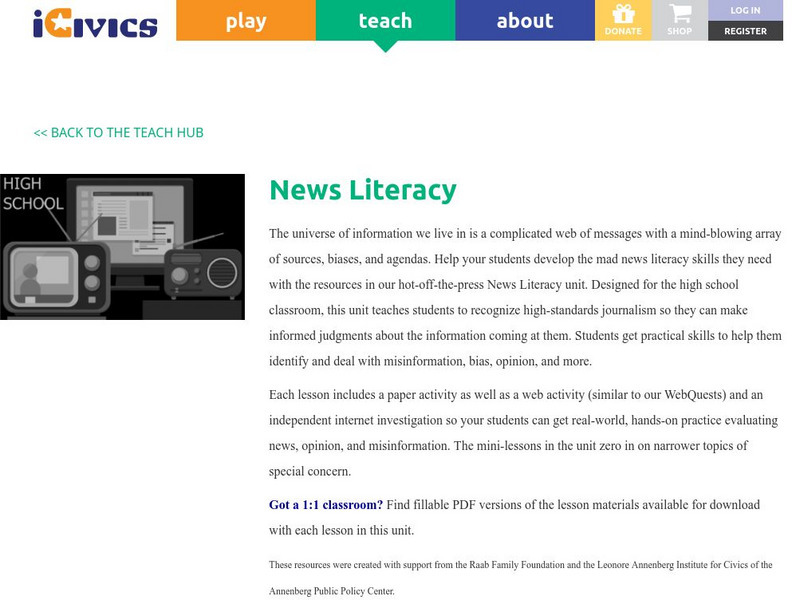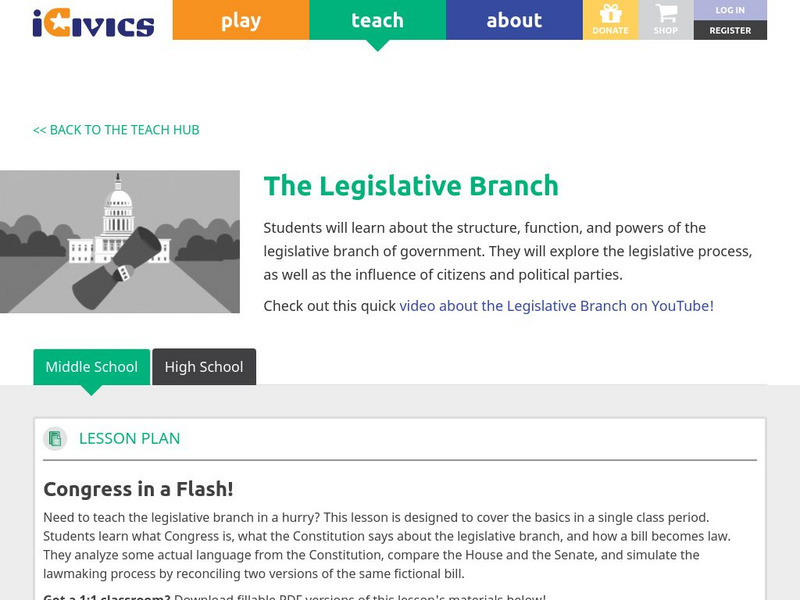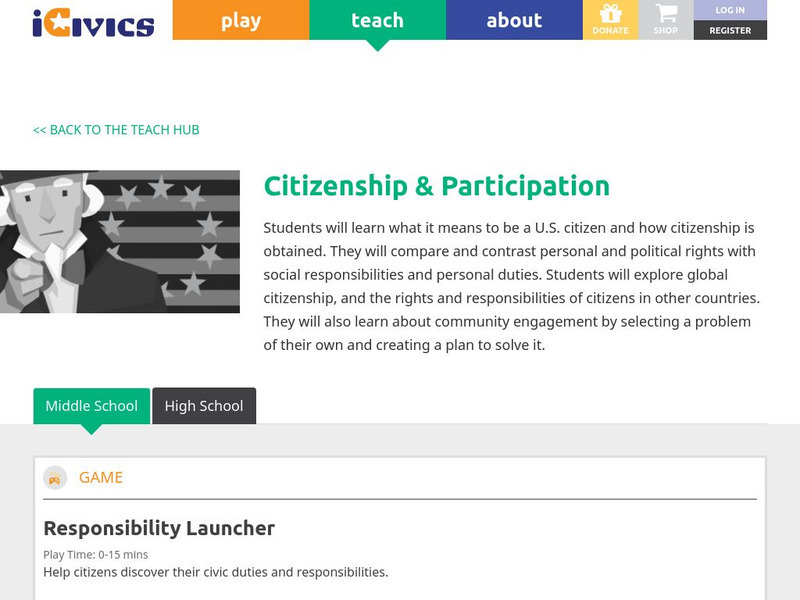iCivics
I Civics: News Literacy
Use this library of mini-lessons to teach students to recognize high-standards journalism so they can make informed judgments about the information coming at them and to help them identify and deal with misinformation, bias, opinion, and...
iCivics
I Civics: Civil Rights
Use this library of mini-lessons to teach students about the early days of the expansion of slavery in the United States through the momentous 1950s and 60s and into the modern Civil Rights Movement.
iCivics
I Civics: The Constitution: Rules for Running a Country
Handy introduction to the Constitution of the United States, which has been our government's rulebook since 1789.
iCivics
I Civics: A Growing Nation
In this unit, students learn how the United States began to grow as soon as it became a nation, and they examine the effect of this growth on societies already established in North America. Register for a free account to download teacher...
iCivics
I Civics: Legislative Branch
Students will learn about the structure, function, and powers of the legislative branch of government. They will explore the legislative process, as well as the influence of citizens and political parties. Register for a free account to...
iCivics
I Civics: Executive Branch
Students will learn about the executive branch, including the unique role and powers of the president and the function of executive departments and agencies. They will explore key facets of foreign policy and the president's role in it....
iCivics
I Civics: The Judicial Branch
Learners will learn about the federal and state courts and what they do. They will explore the courts' role in fairly settling disputes and administering justice, and the unique role of the U.S. Supreme Court in interpreting the U.S....
iCivics
I Civics: Curriculum Unit Landmark Library
This library of mini-lessons targets a variety of landmark cases from the United States Supreme Court and includes a one-page reading and a one-page activity.
iCivics
I Civics: Citizenship & Participation
Students will learn what it means to be a U.S. citizen, how citizenship is obtained, the rights and responsibilities of citizens, and community engagement.
iCivics
I Civics: Mock Election
In this three-day mock election simulation lesson, students explain the steps taken from party formation to national election.
iCivics
I Civics: Colonial Influences
Where did the American colonists get their ideas that lead to a revolution and a whole new kind of government? This lesson explores the Magna Carta, Mayflower Compact, English Bill of Rights, Cato's Letters, and Common Sense.
iCivics
I Civics: Voting by Mail
Because of concerns over COVID-19, many states may ask people to vote by mail this year. Are you ready to vote on Election Day 2020?
iCivics
I Civics: Students Power Elections
This guide will help kids learn about voting and elections independently and find ways to engage if they are not eligible to vote.
iCivics
I Civics: Cabinet Building
This lesson plan takes a look at the history of the presidential cabinet, how the cabinet is built through the confirmation process, and why this elite group of people matters to you.
iCivics
I Civics: Stepping Forward: The Fight for College Integration
First accepted and then rejected from the University of Alabama for being Black, Autherine Lucy and Pollie Ann Myers didn't take no for an answer.
iCivics
I Civics: Mini Lesson: Gerrymandering
Students will try their hand at a simplified districting exercise and learn about the common gerrymandering practices of packing and cracking districts. Students then explore the media's traditional roles as gatekeeper, agenda-setter,...
iCivics
I Civics: Mini Lesson: Filibusters
Learners learn about filibusters and how and why senators use them, then they take a look at how news coverage of a filibuster can be transformed through neutral, positive, or negative framing.
iCivics
I Civics: Municipal Government
In this lesson, students will explore the varied functions and structures of local government as well as explore the services provided in their own municipality and beyond.
iCivics
I Civics: County Government
This instructional activity covers the diversity in county government structure, duties, and services as well as the budgeting process.
iCivics
I Civics: Constitutional Principles
The Founding Fathers created a government based on a set of fundamental principles carefully designed to guarantee liberty. This lesson lets students look at the Constitution from the perspective of its foundational principles and make...
iCivics
I Civics: The Federalist Debate
The ratification debate between the Federalists and Anti-Federalists gives us insight into the ideas behind both sides and a better understanding of how our government developed in its early years.
iCivics
I Civics: Mini Lesson: The Incumbent Advantage
Young scholars will learn about the electoral advantage that favors incumbents and the benefits and drawbacks of reelecting members of Congress.
iCivics
I Civics: Mini Lesson: Congressional Committees
Young scholars discover the different types of congressional committees and their responsibilities in this lesson.
iCivics
I Civics: Mini Lesson: Executive Orders
Students discover how presidents use executive orders to wield power and how the legislative and judicial branches support and challenge these measures.









